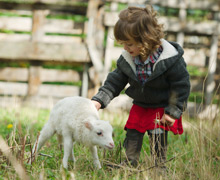
Many parents of newborns make sure everything their baby comes in contact with is as clean as possible. But researchers at The Ohio State University say too clean is not necessarily a good thing. They found babies exposed to farm animals while growing up have a more diverse gut microbiome and robust immune system.
The scientists’ findings published in the journal Frontiers in Immunology show allowing babies to get a little dirty as they grow up exposes them to a wide variety of environmental bacteria and may help them fend off illness.
Researchers discovered the bacteria and other microbes found in the intestines of rural Amish babies were much more beneficially diverse than what was found in urban babies. Evidence shows a healthier gut microbiome could be responsible for the development of a more vigorous respiratory immune system.
"Good hygiene is important, but from the perspective of our immune systems, a sanitized environment robs our immune systems of the opportunity to be educated by microbes,” said the study's co-lead author Zhongtang Yu, a professor of microbiology in Ohio State's Department of Animal Sciences. “Too clean is not necessarily a good thing."
Scientists collected fecal samples from 10 babies in Ohio between the age of six months and a year old. Five were from rural Amish homes with farm animals and the others lived in a mid-sized city with no known livestock contact.
The samples showed a wide variation in microbes with an abundance of beneficial bacteria among the Amish babies not found in the others. That’s what researchers expected because of the exposure to livestock and the belief Amish families live a relatively less sanitized lifestyle when compared to most other Americans.
"The priming of the early immune system is much different in Amish babies, compared to city dwellers," said co-lead author and fellow professor Renukaradhya Gourapura.
The purpose of the study was to help understand how these differences might affect the development of the immune system because previous studies have shown a decrease in allergies and asthma among children from Amish and other rural populations without pinpointing the direct cause.
Researchers have a theory called the “hygiene hypothesis,” which is thought the ultra-clean modern life with the prevalence of hand sanitizers and antibacterial soaps is a contributor to the increase in autoimmune and allergic diseases.
It is thought the Amish babies from the study had better development of lymphoid and myeloid immune cells in the intestines as a result of the exposure to their less-than-sterile environment.
"From the day of their birth, these Amish babies were exposed to various microbial species inside and outside of their homes," Gourapura said. "Indeed, there was a big difference in the generation of critical immune cells. Researchers know that the gut microbiome likely plays a significant role in development of the immune system and in the onset of various metabolic processes and infectious diseases, but we need better models to discover the details of that process so that we can use that information to improve human health."
While researches made livestock a point of emphasis for the study, another variance between the subjects is the fact all five Amish babies were breast-fed and two of the city babies were formula-fed. Another important factor that could have contributed to the variance in gut microbiome is the Amish families grew and ate their own produce.
